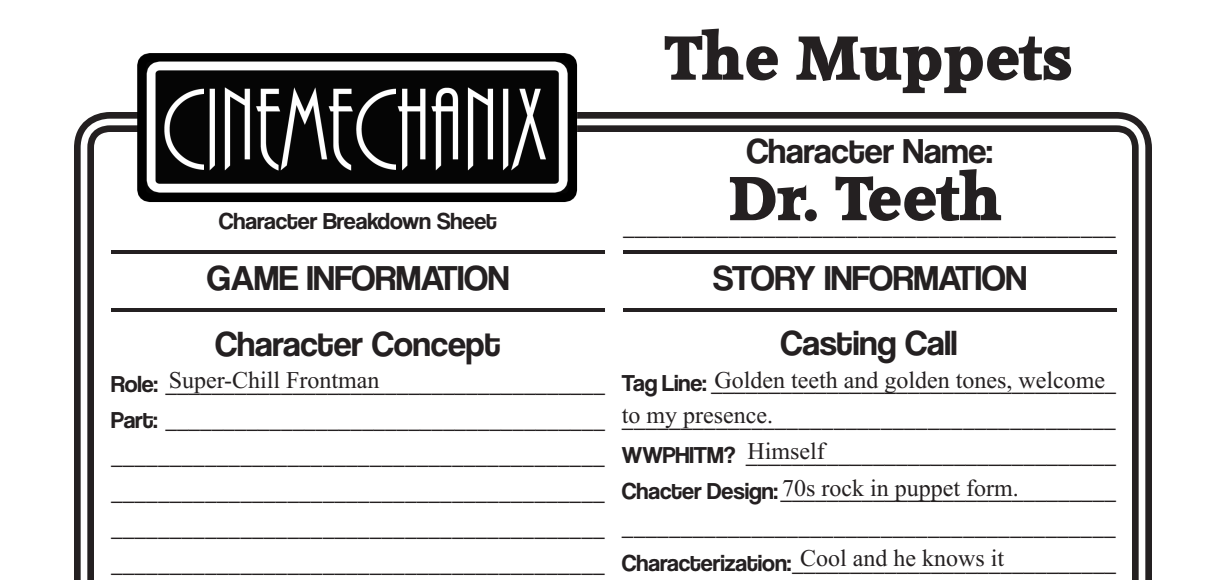We may earn money or products from the companies mentioned in this post.
Last week, I talked about the fact that character sheets are inherently incomplete and that it might be a good idea to rethink them. This week I’m going to float a new definition of a character sheet: “A character sheet should describe the relevant traits of a character at a particular point in time and helps the GM and player understand the character’s role in the game.” Since that doesn’t sound all that different from the standard definition (and since stopping here would make for a short column), I’ll expand on that.
First off, the character sheet describes relevant traits. Relevant to what? Two things: The game and the character.
Relevance to the game means that a trait or ability is likely to come into play with some frequency during the game. For most games, that means things like combat and investigation. If a character is better than average at something that’s going to come up often, you need some mechanics to back it up. In some cases, what’s relevant and what isn’t will depend on the setting. For example, if a game is set five years after the fall of civilization, a lot of a character’s pre-fall abilities just aren’t relevant anymore and can be handled as background rather than mechanics. For a fictional example, take Xander’s construction job in the later seasons of Buffy. Even though it was his full-time job, Xander only used his abilities a few times on screen, usually in cases where a sane GM wouldn’t call for a roll in the first place. If Xander were a character in Contractor: The Sawing, he might need mechanics for his construction skills. For a game about fighting monsters, not so much.
Relevance to the character means that a particular trait is important to the character’s identity even if it’s not likely to come up as something that requires a skill roll in the game. If you think of RPG characters like characters from a book or movie, these traits would be things you’d describe to someone who wasn’t familiar with the story. Not every character that served in the military necessarily needs a mechanic for it, but someone like Walter Sobchak from The Big Lebowski should probably have a ‘Nam-related trait because Walter’s military service is key to his identity. Getting back to Xander, he’d probably have a comic book or nerd trivia skill of some sort, because his geekdom is something that comes up over and over again. Agent Booth from Bones, on the other hand, wouldn’t have a comic book skill because no fan of the show would use “comic book nerd” in a capsule description of the character. Sure, he’s been known to sit in the bathtub with a beer helmet reading Green Lantern, but comics aren’t a major part of his life.
So what about all those other skills that aren’t on the character sheet? How do we account for those mechanically? Fortunately, most games already have a way of doing that with default rolls of some sort. Unless a system’s default rolls are really geared toward failure for unskilled rolls, the chances of failure aren’t going to be much higher on a default roll than they are for a low-rated trait anyway, and that’s exactly where traits that aren’t character-relevant are probably going to fall. If the GM really thinks a character should have a better-than-default chance of doing something because of established character background, he can always give the player a bonus. If the GM decides not to give a bonus but the player feels like he really deserves one, most games these days have some sort of bennie system, so spending Yum Yums (or whatever) is always an option. This is basically the classic trope from fiction when you find out that a character just happens to have an ability right when that ability becomes useful to moving the plot along, like when we find out in Die Hard 4 that John McClane’s been taking flying lessons.
But what about game balance and continuity? Won’t handling skills like this potentially cause characters to have a long list of “phantom abilities” that cause all-new problems because they’re not written down? Wouldn’t that make characters who make use of “unlisted” abilities regularly more powerful than those who don’t? Not really. For starters, game balance is a myth anyway, but that’s a topic for a future column. Continuity isn’t a problem because the skill list isn’t an inventory–you can try anything, even if it’s not on your character sheet or established by background. Also, from a story perspective it doesn’t matter if a character succeeded last time because he got a bonus and failed this time because the GM decided to withhold the bonus or the player was out of Yum Yums. He failed this time because the helicopter’s controls were different than the ones he’s used to, or because he’s hung over, or because the sun was in his eyes, or for any of the reasons that are used when a character fails a roll on his highest-rated trait. Also, keep in mind that since we’ve already made sure to include mechanics for common game actions, these things are going to be outliers. In most case, the character will never have an opportunity to attempt them again. If a player starts using an ability constantly after pulling an “I took a class in college” trick, the GM is perfectly justified in asking the player to buy a trait for it since it’s become a character-relevant ability (since it’s becoming his SOP) and a game-relevant ability (since the character is making it a common game action).
That kind of brings us to the next part of my description of a character sheet, which is that the character sheet describes the character at a particular point in time. In most games, the character sheet describes the character from the beginning of the game because we mostly just add new abilities. If a character was once good at something, he’s always that good at it or better, never worse. But in the real world, people tend to get rusty when they don’t stay in practice, and there are only so many things you can practice regularly. So, instead of just adding new stuff to the character sheet, I think it might be better to just trade the old stuff out for new stuff. Instead of having an ever-growing list of traits, the character basically has a set number of “slots” (which probably increases as the character gets more powerful) for different kinds of traits and the player can switch them out whenever it’s appropriate. Going back to Buffy, Willow doesn’t add the “Witch” Job to her character sheet alongside her “Computer Nerd” Job in Season 4, she replaces the “Computer Nerd” Job with “Witch.”*
When is changing words around appropriate and how major can the changes be? It depends on what’s going on in the game. If the first session of the game is “the world/your character” just changed fundamentally and the second session takes place a while later after everyone’s gotten used to the change, the characters might get to make major changes to their characters between the first and second session. If the plan is to actually play through the characters’ adjustments to the new world/job/knowledge/whatever, I might let them make one change per session until they’ve settled into their new roles. Further into a game, I’d allow minor changes whenever they made sense and allow more substantial changes at the end of major story arcs. The sorts of the changes allowed would depend on how much time passes between arcs. If the game picks up very soon after the previous story arc, only minor changes that followed from or were foreshadowed by the last story would be allowed. If the new story takes place months or years later, players would be allowed to make bigger changes. For most games I’d probably stick with a TV series kind of arrangement where the new “season” picks up a few months after the previous one. Some characters may have gone through some changes, but they’re not completely different people than they were at the end of the previous season.
Does changing the characters around like this mean the characters lose abilities? I don’t think so. We’ve already covered some ways that “unlisted” abilities can be handled. More importantly, though, is the last part of the definition, that the character sheet helps define the role of the character in the game. Explaining by example is probably easiest here, so let’s go back to Willow. When the player changes Willow’s Job from “Computer Nerd” to “Witch,” that’s a signal for the GM that the player wants the character to do magical stuff instead of hacking, so the GM should change around the kinds of problems Willow will face to accommodate that desire. In addition, Willow’s player is telling the GM “when faced with a problem, I’m going to try to find a magical solution rather than a technological one.” So, for instance, when the gang needs to find information on someone, she’s going to cast a spell rather than start searching the internet and hacking databases.
Putting these ideas into action will obviously require some tweaking of whatever system you’re playing, but unless you’re playing something like D&D with structured level progression, I think it’s doable. The biggest challenge is overcoming the expectation that character improvement and escalation of abilities are synonymous, which is probably best done through non-mechanical story rewards like resources and stature. If anyone has other ideas, let me know.
*Actually, since she probably had a “Witch” Skill in Season 3, she probably just transposes them; “Computer Nerd” gets moved to the Skill slot previously occupied by “Witch,” “Witch” gets upgraded to a Job. To some extent, this is still the QAGS 2E system but we’re ignoring all the weird numerical clunkiness in favor of simplicity.




